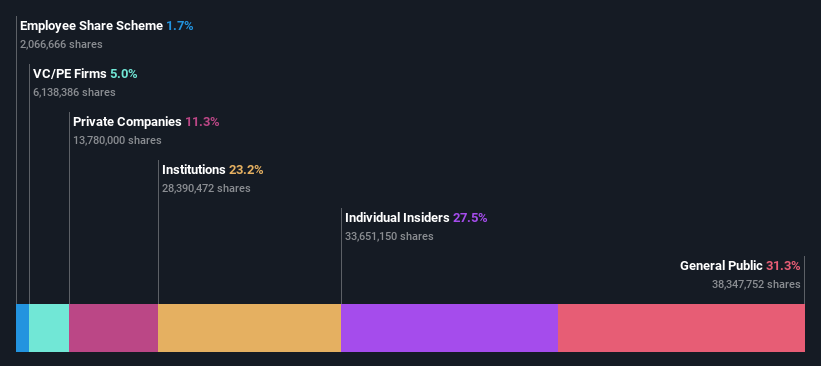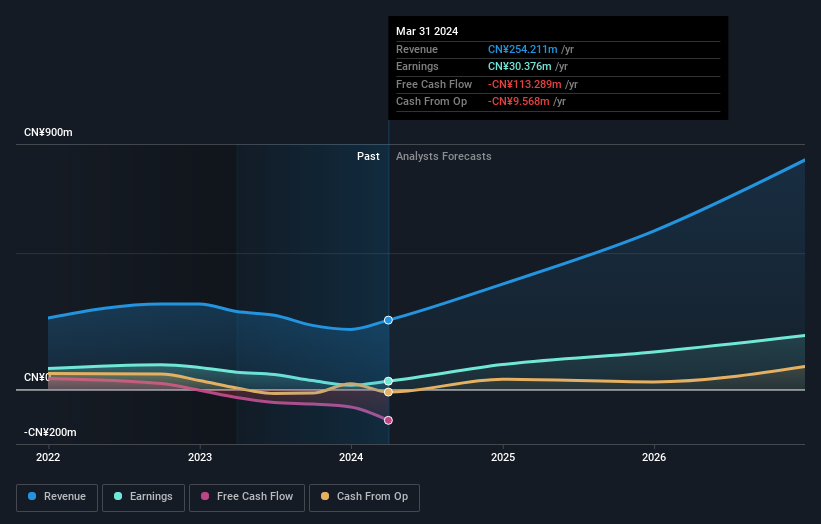- China
- /
- Communications
- /
- SHSE:688143
Yangtze Optical Electronic Co., Ltd.'s (SHSE:688143) 11% gain last week benefited both retail investors who own 31% as well as insiders

Key Insights
- Yangtze Optical Electronic's significant retail investors ownership suggests that the key decisions are influenced by shareholders from the larger public
- The top 9 shareholders own 51% of the company
- 27% of Yangtze Optical Electronic is held by insiders
If you want to know who really controls Yangtze Optical Electronic Co., Ltd. (SHSE:688143), then you'll have to look at the makeup of its share registry. The group holding the most number of shares in the company, around 31% to be precise, is retail investors. In other words, the group stands to gain the most (or lose the most) from their investment into the company.
While retail investors were the group that benefitted the most from last week’s CN¥302m market cap gain, insiders too had a 27% share in those profits.
Let's delve deeper into each type of owner of Yangtze Optical Electronic, beginning with the chart below.
View our latest analysis for Yangtze Optical Electronic

What Does The Institutional Ownership Tell Us About Yangtze Optical Electronic?
Institutions typically measure themselves against a benchmark when reporting to their own investors, so they often become more enthusiastic about a stock once it's included in a major index. We would expect most companies to have some institutions on the register, especially if they are growing.
As you can see, institutional investors have a fair amount of stake in Yangtze Optical Electronic. This can indicate that the company has a certain degree of credibility in the investment community. However, it is best to be wary of relying on the supposed validation that comes with institutional investors. They too, get it wrong sometimes. When multiple institutions own a stock, there's always a risk that they are in a 'crowded trade'. When such a trade goes wrong, multiple parties may compete to sell stock fast. This risk is higher in a company without a history of growth. You can see Yangtze Optical Electronic's historic earnings and revenue below, but keep in mind there's always more to the story.

Hedge funds don't have many shares in Yangtze Optical Electronic. With a 20% stake, CEO Yabin Pi is the largest shareholder. The second and third largest shareholders are Wuhan Jinding Venture Capital Co., Ltd. and Jun Xin, with an equal amount of shares to their name at 5.3%.
On further inspection, we found that more than half the company's shares are owned by the top 9 shareholders, suggesting that the interests of the larger shareholders are balanced out to an extent by the smaller ones.
While it makes sense to study institutional ownership data for a company, it also makes sense to study analyst sentiments to know which way the wind is blowing. Quite a few analysts cover the stock, so you could look into forecast growth quite easily.
Insider Ownership Of Yangtze Optical Electronic
The definition of company insiders can be subjective and does vary between jurisdictions. Our data reflects individual insiders, capturing board members at the very least. The company management answer to the board and the latter should represent the interests of shareholders. Notably, sometimes top-level managers are on the board themselves.
I generally consider insider ownership to be a good thing. However, on some occasions it makes it more difficult for other shareholders to hold the board accountable for decisions.
It seems insiders own a significant proportion of Yangtze Optical Electronic Co., Ltd.. It has a market capitalization of just CN¥3.0b, and insiders have CN¥823m worth of shares in their own names. It is great to see insiders so invested in the business. It might be worth checking if those insiders have been buying recently.
General Public Ownership
The general public-- including retail investors -- own 31% stake in the company, and hence can't easily be ignored. This size of ownership, while considerable, may not be enough to change company policy if the decision is not in sync with other large shareholders.
Private Equity Ownership
Private equity firms hold a 5.0% stake in Yangtze Optical Electronic. This suggests they can be influential in key policy decisions. Some might like this, because private equity are sometimes activists who hold management accountable. But other times, private equity is selling out, having taking the company public.
Private Company Ownership
We can see that Private Companies own 11%, of the shares on issue. Private companies may be related parties. Sometimes insiders have an interest in a public company through a holding in a private company, rather than in their own capacity as an individual. While it's hard to draw any broad stroke conclusions, it is worth noting as an area for further research.
Next Steps:
I find it very interesting to look at who exactly owns a company. But to truly gain insight, we need to consider other information, too. Case in point: We've spotted 2 warning signs for Yangtze Optical Electronic you should be aware of, and 1 of them is a bit unpleasant.
But ultimately it is the future, not the past, that will determine how well the owners of this business will do. Therefore we think it advisable to take a look at this free report showing whether analysts are predicting a brighter future.
NB: Figures in this article are calculated using data from the last twelve months, which refer to the 12-month period ending on the last date of the month the financial statement is dated. This may not be consistent with full year annual report figures.
New: Manage All Your Stock Portfolios in One Place
We've created the ultimate portfolio companion for stock investors, and it's free.
• Connect an unlimited number of Portfolios and see your total in one currency
• Be alerted to new Warning Signs or Risks via email or mobile
• Track the Fair Value of your stocks
Have feedback on this article? Concerned about the content? Get in touch with us directly. Alternatively, email editorial-team (at) simplywallst.com.
This article by Simply Wall St is general in nature. We provide commentary based on historical data and analyst forecasts only using an unbiased methodology and our articles are not intended to be financial advice. It does not constitute a recommendation to buy or sell any stock, and does not take account of your objectives, or your financial situation. We aim to bring you long-term focused analysis driven by fundamental data. Note that our analysis may not factor in the latest price-sensitive company announcements or qualitative material. Simply Wall St has no position in any stocks mentioned.
About SHSE:688143
Yangtze Optical Electronic
Engages in the research and development, production, and sale of special optical fibers and cables, photoelectric systems, special optical devices, new materials, high-end equipment, and optoelectronic systems in China.
High growth potential with adequate balance sheet.

